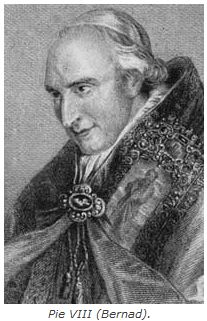
In the conclave of 1829 (February 22-31 March), Cardinal Castiglioni was elected Pope. Firm in defence of the rights of the Church, he was conciliatory in matters which were strictly political. As a result, he recognized Louis Philippe as King of the French on the day after the July Revolution of 1830. Debilitated by disease, Pius VIII died at the age of 69 years on November 30, 1830.
In 1826, Father de Mazenod went at least three times to see Cardinal Castiglioni, the Grand Penitentiary at the time, to ask for several indulgences. During a first visit on January 2, the Cardinal was courteous, but raised several objections to approbation of the Rule. The Founder wrote to Father Tempier: “My whole fear is that he may speak to the Pope in the same way as to me and that this verbiage may have an adverse effect on the Holy Father who has shown himself up to now so favourable…” (Oblate Writings I, vol. 7, no. 215, p. 2) At the time, the Founder was unaware that the Cardinal knew about the December 8 letter from Bishop Arbaud opposing the approbation of the Rules. The letter, however, did not convince the Cardinal, who, after having seen the Pope, was in favour of approbation. On January 4, he went to visit Bishop Marchetti to warmly recommend this business while heaping the most fulsome praise on Father de Mazenod.
After the election of Pius VIII on March 31, 1829, the Founder, taking some time of rest in Grans in the month of August, wrote to Father Tempier to ask him to draw up a pastoral letter which would announce the jubilee on the occasion of the election of the Pope. From Billens in Switzerland on October 28, 1830, after the Pope had granted recognition to Louis Philippe as King of the French the Founder asked Father Tempier to “let this decision be known and abstain from forbidding what it authorizes. One must be consistent in one’s positions. The Pope, doctor of the Church, has pronounced himself, let that suffice for our consciences.” (Oblate Writings I, vol. 7, no. 369, p. 221)
During the course of the summer of 1829, Father de Mazenod sent the Pope a copy of a biography of Blessed Alphonsus (written by President de Mazenod and Father Jeancard); then, from Switzerland in the summer of 1830, he wrote to Pius VIII again to assure him, in his own name and in the name of his small society, the honour and reverence they felt was his due as successor of Peter and to ask for a confirmation of the approbation of the Congregation. The Pope responded to these letters on September 2, 1829 and August 26, 1830.
Yvon Beaudoin, o.m.i.
